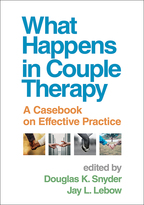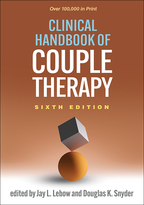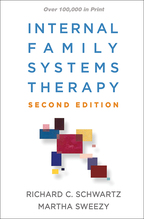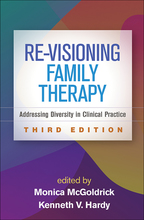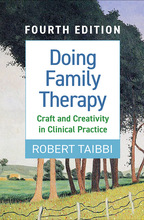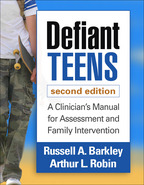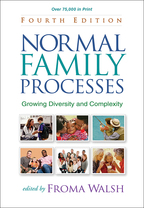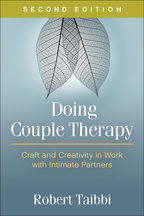The Ways We Love
A Developmental Approach to Treating Couples
Sheila A. Sharpe
Paperback
Paperback
orderJanuary 28, 2004
ISBN 9781593850197
Price: $50.00 356 Pages
Size: 6" x 9"
Copyright Date: 2000
Sign up for emails on upcoming titles on Families & Couples (with special discounts)!
“A sophisticated yet eminently readable piece of work....Devoid of jargon and beautifully laced with instructive clinical vignettes. It can be read profitably by any practitioner who works with families or couples.”

—Psychiatric Services
“This book provides us with the first comprehensive theory of the normal development of love relationships and an associated treatment approach....I have found Sharpe's model to be a tremendous aid in assessing and treating couples.”

—The Psychoanalytic Quarterly
“An excellent resource....This presentation captures the complexity of actual couples therapy and gives the reader the opportunity to get to know the case study couples more completely in both their difficulties and their relational repair work.”

—Journal of Couple & Relationship Therapy
“This book demonstrates that Sharpe is among the most creative and astute couple therapists of our era. Her developmental perspective allows therapists to move beyond a pathologizing stance, and to find a perspective that makes day-to-day stressors more readily understood. Clear and engaging, this book will undoubtedly be useful for both seasoned and less experienced therapists. I have used the book extensively as a text in graduate courses, and my students describe it as practical and inspiring. As a resource to recommend to clients, including new parents and other couples at critical junctures in their lives, The Ways We Love is reassuring and thought-provoking.”

—Judith Siegel, PhD, Ehrenkranz School of Social Work, New York University
“This engaging, nourishing text offers a well-balanced meal for clinicians and couples. Sharpe calls on her years of clinical experience to identify seven themes in couple relationships—nurturing, merging, idealizing, devaluing, controlling, competing for superiority, and competing in love triangles. Illuminated are the developmental histories of these themes, their adaptive and pathological dimensions, and their consequences both for the relationship and for the partners as individuals. Countering a trend toward oversimplification in this field, Sharpe appreciates complexity. She is remarkably open about her own emotional reactions and evocatively descriptive of her patients' experience. The treatment model elaborated here should be of practical use to both therapists and clients.”

—Robert Winer, MD., The Washington School of Psychiatry
“The variety and range of relationship difficulties traverse many kinds of distress, defying attempts to organize them into categories. This groundbreaking book graphically illustrates, from a developmental perspective, the manifold ways partners express their relational pain. Sharpe advances the field of couple therapy by delineating seven universal, clinically meaningful patterns of intimate relating. Based on many years of experience treating couples, the book demonstrates rare clinical sophistication. One aspect is a particular gift—Sharpe's honesty and openness in revealing the personal thoughts, feelings, and frustrations that come up for her as a therapist dealing with very difficult situations. The book is easy to read and the case histories are fascinating.”

—James L. Framo, PhD, Distinguished Professor, Emeritus, United States International University
“Psychoanalysis has concerned itself largely with the development of individuals—and only through the period of adolescence. Sheila Sharpe stretches the psychoanalytic canvas to make space for a developmental model of intimate partnerships. A superbly attentive clinician, she graphs her new schema for us with precision and wit.”

—Deborah Anna Luepnitz, PhD, author of The Family Interpreted: Psychoanalysis, Feminism and Family Therapy
“This book demonstrates that Sharpe is among the most creative and astute couple therapists of our era. Her developmental perspective allows therapists to move beyond a pathologizing view, while allowing for a full integration of object relations and systems concepts. Her approach to couples work invites us to view the couple's struggles with dignity and compassion. She portrays couples and her work with them in an honest, revealing manner, and, unlike many therapists, recognizes and responds to the impact of day-to-day stressors. The book is clear, engaging, and will undoubtedly be useful for both seasoned and less experienced therapists. I also plan to use it as a text in the graduate-level couples courses I teach.”

—Judith Siegel, PhD, Associate Professor, Ehrenkranz School of Social Work, New York University
—Psychiatric Services
“This book provides us with the first comprehensive theory of the normal development of love relationships and an associated treatment approach....I have found Sharpe's model to be a tremendous aid in assessing and treating couples.”
—The Psychoanalytic Quarterly
“An excellent resource....This presentation captures the complexity of actual couples therapy and gives the reader the opportunity to get to know the case study couples more completely in both their difficulties and their relational repair work.”
—Journal of Couple & Relationship Therapy
“This book demonstrates that Sharpe is among the most creative and astute couple therapists of our era. Her developmental perspective allows therapists to move beyond a pathologizing stance, and to find a perspective that makes day-to-day stressors more readily understood. Clear and engaging, this book will undoubtedly be useful for both seasoned and less experienced therapists. I have used the book extensively as a text in graduate courses, and my students describe it as practical and inspiring. As a resource to recommend to clients, including new parents and other couples at critical junctures in their lives, The Ways We Love is reassuring and thought-provoking.”
—Judith Siegel, PhD, Ehrenkranz School of Social Work, New York University
“This engaging, nourishing text offers a well-balanced meal for clinicians and couples. Sharpe calls on her years of clinical experience to identify seven themes in couple relationships—nurturing, merging, idealizing, devaluing, controlling, competing for superiority, and competing in love triangles. Illuminated are the developmental histories of these themes, their adaptive and pathological dimensions, and their consequences both for the relationship and for the partners as individuals. Countering a trend toward oversimplification in this field, Sharpe appreciates complexity. She is remarkably open about her own emotional reactions and evocatively descriptive of her patients' experience. The treatment model elaborated here should be of practical use to both therapists and clients.”
—Robert Winer, MD., The Washington School of Psychiatry
“The variety and range of relationship difficulties traverse many kinds of distress, defying attempts to organize them into categories. This groundbreaking book graphically illustrates, from a developmental perspective, the manifold ways partners express their relational pain. Sharpe advances the field of couple therapy by delineating seven universal, clinically meaningful patterns of intimate relating. Based on many years of experience treating couples, the book demonstrates rare clinical sophistication. One aspect is a particular gift—Sharpe's honesty and openness in revealing the personal thoughts, feelings, and frustrations that come up for her as a therapist dealing with very difficult situations. The book is easy to read and the case histories are fascinating.”
—James L. Framo, PhD, Distinguished Professor, Emeritus, United States International University
“Psychoanalysis has concerned itself largely with the development of individuals—and only through the period of adolescence. Sheila Sharpe stretches the psychoanalytic canvas to make space for a developmental model of intimate partnerships. A superbly attentive clinician, she graphs her new schema for us with precision and wit.”
—Deborah Anna Luepnitz, PhD, author of The Family Interpreted: Psychoanalysis, Feminism and Family Therapy
“This book demonstrates that Sharpe is among the most creative and astute couple therapists of our era. Her developmental perspective allows therapists to move beyond a pathologizing view, while allowing for a full integration of object relations and systems concepts. Her approach to couples work invites us to view the couple's struggles with dignity and compassion. She portrays couples and her work with them in an honest, revealing manner, and, unlike many therapists, recognizes and responds to the impact of day-to-day stressors. The book is clear, engaging, and will undoubtedly be useful for both seasoned and less experienced therapists. I also plan to use it as a text in the graduate-level couples courses I teach.”
—Judith Siegel, PhD, Associate Professor, Ehrenkranz School of Social Work, New York University



